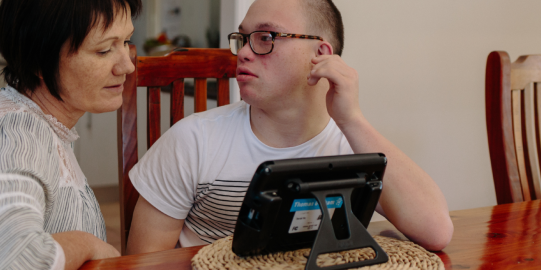AAC can help manage overwhelming stress. "I do still prefer Proloquo2Go during moments of particular overwhelm, even though it's not the pictures that are important to me. It mostly just helps to be able to locate the word rather than think it up on my own.”
AAC can be essential during a crisis
Some AAC users said that in an extreme crisis, such as on locked psych wards, AAC had prevented restraint and helped staff understand what was happening. “I was completely non verbal and so used AAC. I get very distressed in psych hospitals and end up having many meltdowns and being restrained a lot, but this time after I had calmed down I was able to explain better to staff how I felt and what had happened to cause the meltdown.
I was able to communicate with the psychiatrist and get my views across better.
I have never been able to do that in hospital before, and if I have tried then what I have said has been nothing like what I want to say at all.”
“Psychiatric crises are a really intense time that I have to deal with on a semi-regular basis, as someone with co-occurring chronic mental illness. Knowing that I now have a way to more reliably explain what's going on to the professionals at hospitals makes the situation a little less scary.”
AAC can prevent involuntary speech
Several said that it could be as hard to control what not to say as it is to say what they intend. “I might panic and suddenly say a LOT of things (which is, in and of itself, more stressful and exhausting, which fuels into my existing distress), but not all, or none, of those words are useful or actually talking about the REAL problem. They are trying to talk around the words that won't come out. The speech is 100% functional in that, mechanically, the act of verbal mouth speech is taking place, but the QUALITY of the communication is comparatively low.”
Many described a spiral where the attempt to speak something important only made communication worse. “When I am distressed I do not always show it, and I do not always express it because I cannot always SAY it. Instead the words build up and won't come out, so I can't get out of the situation, then I meltdown because it becomes too much, or I start acting up as a way to escape. I make excuses or say ‘I'm fine’ or ‘No problem’ or just ‘Sorry’ because I cannot make my mouth release the words that express how distressed I am.”
AAC can be more functional
All of these AAC users felt that speech was often not "functional." “I sound fluent, but that doesn't mean I can tell you that I need to!” They experienced a disconnect between what they intended to say, and what actually came out. “Speech isn’t functional unless it matches the words in your head.”
Many felt underestimated if they are judged by what they can speak, versus what they want to communicate. "My speech is not functional without AAC in the sense that I'm not able to have my needs met (for example, ask for help, explain what is wrong or what I need). I am also unable to show my higher level thinking.”
Choose communication over speech
Many of these AAC users were frustrated that professionals and families seemed satisfied with very limited “functional” speech. “Speech was pushed as the only option, and your speech had to be PERFECT.”





